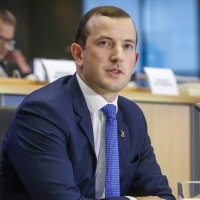Environmental protection in Antarctica: What should be the priorities for the new Biden Administration?
The Biden Administration faces many challenges as it develops an approach to international environmental issues. Join us for a discussion with leaders and experts focusing on key environmental challenges in Antarctica, on land and in the Southern Ocean. As the Antarctic Treaty System marks the thirtieth anniversary of the signing of the landmark Environmental Protocol to the Antarctic Treaty, the panel will focus on how the United States can contribute to environmental protection in Antarctica in the near term, in particular related to marine protection, such as new marine protected areas.
Speaker Quotes
The Honorable Sheldon Whitehouse
"From a diplomatic point of view, these use conflicts, which are the hallmark of climate change, risk creating real international conflicts, and so we've got to work on using various mechanisms that we have to foment a peaceful, orderly, responsible resolution of international conflict in the space."
"Focusing on the Arctic brings into stark relief how rapidly climate change is overwhelming us. It causes us, or should cause us, to think more carefully about why it is that we're not acting responsibly through governments to take on this crisis. And that should in turn focus on the apparatus that the fossil fuel industry has built, and funded, and utilized for decades, but in the US particularly aggressively in the last decade to block climate action."
"There are a lot of theories of governance around in the world right now. The American theory of governance is not the only one, and if we want ours to stand out as the good one, we've got to live that, too. The world is going to know for a long time that America walked away from action on climate change, because it allowed its government to be corrupted by the fossil fuel industry, and that's just a blemish that we're going to have to live with. There's no way to undo the facts. But the sooner we can reverse them, and the sooner we can get back to a Congress that operates based on facts, and policy, and good judgment, and protecting the general welfare rather than the power of a special interest, the better our American example will be."
Commissioner Virginijus Sinkevičius
"The first and most pressing issue is the fight against climate change, and it's crucial that we succeed in limiting global warming well below two degrees Celsius compared to pre-industrial levels, and we therefore welcome President Biden's decision to return the US to the Paris Agreement. The EU is fighting climate change through ambitious policies at home and close cooperation with international partners. At home, we are on track to meet our greenhouse gas emissions reduction targets and have put forward a plan to further cut emissions by at least 55% by 2030 and our aim, of course, is to become climate neutral by 2050."
"If we want to tackle climate change comprehensively we also need to address resource extraction and processing which accounts for around 50% of greenhouse gas emissions and in making the transition to a circular economy we can curb this often forgotten 50%. At the same time, we see circular economies as a triple-win policy, generating net-savings for business, creating jobs and of course lowering environmental impact."
"Unfortunately, China and Russia continue to block the adoption of our MPA proposals over concerns that they may affect their fisheries interests and this was—again—the case at the latest CCAMLR annual meeting in October 2020 and although we are disappointed that CCAMLR was once again unable to reach agreement on our proposals on that occasion, we are heartened by the broad support we received from other members."
"The Biden administration could raise the designation of new Antarctic MPAs in its meetings with Chinese and Russian stakeholders and use its diplomatic clout to keep this issue high on the international agenda and we will have a bigger impact if we all speak of course with one voice."
Ambassador Helen Ågren
"The Southern Ocean is an extraordinary ocean. It is key to understanding how our world works and our impact upon it. Antarctica plays a crucial role in the protection of our planet, or ocean, and marine life, and it's important to science because of its profound effect on the Earth's climate and ocean systems enshrined in its four-kilometer thick cover of ice, [which] is a unique record of the climate of the past couple of years. So climate change poses the greatest threat to the ocean, and in combination with overexploitation, pollution, and eutrophication, the marine environment, its biodiversity, and the very functioning of ecosystems are apparent. "
"As [the] current CCAMLR chair, Sweden is committed to create the space for substantive dialogue between CCAMLR members. We would welcome the U.S. to join efforts in strengthening Southern Ocean conservation and climate action by engaging diplomatically at high levels with current opponents to science-based actions in the Southern Ocean.”"
"We really welcome the Biden administration’s commitment to protect 30% of U.S. land and ocean. This is an ambitious target and Sweden supports also a call for a global target of 30% of the planet’s ocean to be protected by 2030 and we would certainly welcome the U.S. among the champions of this broader call."
Dr. Enric Sala
“We have enough science knowing what areas have to be protected. Commissioners […] made very clear what we need—basically is China and Russia to agree. Now, why hasn’t it happened yet? […] one is the typical excuse; more research is needed […] we have enough research to know what needs to be done and what the problem is. Research is a great tool, but also is one of the best excuses for delaying action.”
"There are two types of areas which we would focus on. One is wild, near-pristine areas that are still functioning, and they look like the ocean of the past, but also they can serve as a blueprint for what the ocean of the future could be. And we need to save this place before it's too late. But also, we have areas that contain unique and irreplaceable marine life biodiversity that is threatened by human activities that can be abated by protected areas. Antarctica as an ocean has both types of areas."
“We published a study a couple of years ago on the economics of fishing in the high seas and found that half of the fishing in the high seas—including the Southern Ocean—would not be profitable without government subsidies. And also, the high seas provide less than 4% of the global seafood catch and most of those species that are caught are high scale items for food-secure countries. So, fishing around Antarctica, fishing in the high seas, is not essential for global food security.”
Dr. Sylvia Earle
"Probably in the last 50 years we have learned more than during all preceding history about the big questions that now face us, but we don’t have 50 years to wait to act on that knowledge, and the headline is climate change."
"Here's the thing—protecting Antarctica, the waters of Antarctica, from what? From whom? What interests are really active? It's mostly the prospect of future mining and the current mining of life. And when you ask, so, who needs to take the life from Antarctica? I think Enric addresses the issue very directly. There is no food security justification. There's no economic justification if you take away the subsidies. So why are we doing it?"
"Government support and capacity building, policymakers—this would be world leaders—must increase high-level support to maintain Antarctica as a model for multilevel governance. Everyone has a stake in what happens to Antarctica. It's not just a single country that has influence. It's the high seas, in a way, but concentrated in the Southern Ocean. Knowing that we must collaborate in order to make decisions, really, I think, brings into focus the importance of Antarctica all of us everywhere."
Introductions

US Ambassador-at-Large for Arctic Affairs; Former Chair, US Arctic Research Commission

Keynote Speaker

Moderator

Former Acting Deputy Assistant Secretary for Oceans and Fisheries and Director for Ocean and Polar Affairs, US Department of State
Panelists




Hosted By

Polar Institute
Since its inception in 2017, the Polar Institute has become a premier forum for discussion and policy analysis of Arctic and Antarctic issues, and is known in Washington, DC and elsewhere as the Arctic Public Square. The Institute holistically studies the central policy issues facing these regions—with an emphasis on Arctic governance, climate change, economic development, scientific research, security, and Indigenous communities—and communicates trusted analysis to policymakers and other stakeholders. Read more


Latin America Program
The Wilson Center’s prestigious Latin America Program provides non-partisan expertise to a broad community of decision makers in the United States and Latin America on critical policy issues facing the Hemisphere. The Program provides insightful and actionable research for policymakers, private sector leaders, journalists, and public intellectuals in the United States and Latin America. To bridge the gap between scholarship and policy action, it fosters new inquiry, sponsors high-level public and private meetings among multiple stakeholders, and explores policy options to improve outcomes for citizens throughout the Americas. Drawing on the Wilson Center’s strength as the nation’s key non-partisan policy forum, the Program serves as a trusted source of analysis and a vital point of contact between the worlds of scholarship and action. Read more


Global Europe Program
The Global Europe Program is focused on Europe’s capabilities, and how it engages on critical global issues. We investigate European approaches to critical global issues. We examine Europe’s relations with Russia and Eurasia, China and the Indo-Pacific, the Middle East and Africa. Our initiatives include “Ukraine in Europe”—an examination of what it will take to make Ukraine’s European future a reality. But we also examine the role of NATO, the European Union and the OSCE, Europe’s energy security, transatlantic trade disputes, and challenges to democracy. The Global Europe Program’s staff, scholars-in-residence, and Global Fellows participate in seminars, policy study groups, and international conferences to provide analytical recommendations to policy makers and the media. Read more


Environmental Change and Security Program
The Environmental Change and Security Program (ECSP) explores the connections between environmental change, health, and population dynamics and their links to conflict, human insecurity, and foreign policy. Read more
